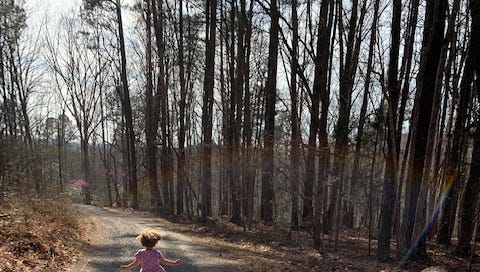I always think it’s funny that the popular-with-parents brand of kids’ juice boxes is called “Honest Kids,” when it’s actually watered-down juice. Better than corn syrup/sugar, for sure! But not totally satisfying, in my experience, as a juice beverage. (Plus the plastic straws!)
Anyway, what I like about young kids, generally, is that they are so honest and transparent. One of my favorite of Bea’s friends is a boy whose honesty first announced itself to me over Zoom. We were at Mamie’s in the early days of the pandemic, doing kindergarten morning meeting on my laptop, and their teacher read them a book about a chicken or a duck or something like that. It was pretty boring (I’ve been there! Sometimes you reach for a book and it disappoints!). When their sweet, beloved teacher asked “What did you think of the story?” Bea’s friend announced, “I didn’t like it.”
Mamie and I cracked up, and it’s been fun to follow this boy through kindergarten, first, and second grade, where there’s a general expectation of enthusiasm from kids. I like enthusiasm too—and Bea has it in spades—but I’m interested in when the things we present as great and cool are not well-received by kids. Recently, on the way home from school, Bea told me about an assignment they had in guidance class, to write letters of support to American soldiers stationed overseas. The letters were supposed to begin “Dear hero,” and this friend of Bea’s, who has been in all her classes, announced that he didn’t like the military.
Bea said she wasn’t sure what to do—she didn’t want to write the letter either, but she also could see that it was important to her teacher, and didn’t want to disappoint her. I told her that I thought her friend’s stand was a principled one, but I also understood why she hesitated to take the same stand. I tried to explain how I felt about the assignment, and why a letter-writing campaign like that could be upsetting to many different kids, for example Iraqi-American kids.
Later I told her Richard about the conversation, how on this brief car ride I tried to explain the second Gulf war, and the treacherous way we got there, and all the people who opposed it—
“You explained all of that?” Richard asked.
“Yeah,” I said. “Sort of? Not well.”
Here’s the thing: it’s hard to be honest with kids about the past, because a lot of what there is to be honest about is a. upsetting, b. very complicated, and c. something that someone wasn’t honest with us about in the first place. Most of us drank the watered-down juice of history, civics, government—and for some, even science—when we were in school.
I don’t always feel equipped to provide the corrective, but I appreciate the way that the presence of others, like Bea’s friend, challenges us to try. These past two years have been so amazingly messed-up: a pandemic, necessary revelations about police brutality, an insurrection, and now the war in Ukraine. We’ve also had continued deception by powerful right-wing forces about all of these things (including, about Putin’s war against Ukraine, by national embarrassment Madison Cawthorn). Plus, each year, increasingly urgent and willfully ignored warnings about the climate crisis. It’s hard to know where to start—sometimes I find that it’s even hard to remember all of it in a single sitting. Did all of these things happen within the past 24 months?
They did, but of course they didn’t start there.
Sometimes it helps to turn things over to someone else, to join your kid in learning what you didn’t learn. So for spring break, Beatrice and I are going on a guided trip with other people who are also looking for a corrective, but also for connection and inspiration. In less than two weeks we’ll board a charter bus with about thirty other people, mostly older folks from Alamance County, that will take us down to Atlanta, Montgomery, Birmingham, and Selma. We’re going to visit the Martin Luther King., Jr. Memorial Park in Atlanta; we’ll cross the Edmund Pettus Bridge in Selma with Thelma Dianne Harris, who was there at the 1965 march known as “Bloody Sunday”; we’re going to visit the Freedom Rides Museum in Montgomery. We’ll tour the Birmingham Civil Rights Institute and the 16th Street Baptist Church, and we’ll visit the Equal Justice Initiative’s Legacy Museum and the National Memorial for Peace and Justice with celebrated tour guide Wanda Battle.
Bea is the youngest participant on this trip by decades. Already we’ve both been welcomed so warmly by this diverse and interesting group. We’ve met people who attended segregated schools in Alamance County, and who learned different things about historically important, under-taught events in their community. Because it wasn’t that long ago—in fact, all of this was so recent we’re still feeling the reverberations.
Bea is so excited about this trip. I hope it won’t be too much for her, that she’ll be able to tell me when it is too much. What gives me confidence, however, is the fact that we aren’t going alone—that we’re both in learning mode, with other people in learning mode right beside us.
At a meeting about the trip last weekend, the tour organizer (by day a hospital worker) asked people to share what they were most looking forward to. “I want to walk in the footsteps of people who came before us,” one woman said. “A chance to hear about true heroes,” one man said. Another woman said something about how difficult things have been in the world lately, how scary. She said what she wanted, most of all, was “a glimmer of hope.”
A glimmer! Such a modest, honest answer. And a beautiful one. We look forward to telling you about this trip as we go, sharing photos and things that we learn. We’re curious: what would you like to hear about?




